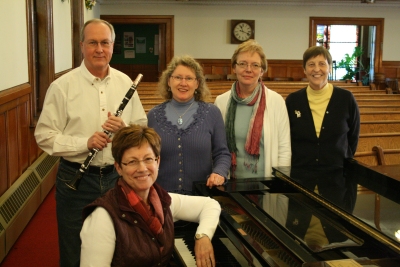Return to Gwyneth Walker Music Catalog
Download an MP3 file of the first movement of this work performed by the Wolf River Singers, Ben J. Leggett, director.
Download an MP3 file of the second movement of this work.
Download an MP3 file of the third movement of this work.
Download an MP3 file of the fourth movement of this work.
Download an MP3 file of the fifth movement of this work.
Download a PDF file of the choral score of this composition. For perusal only -- not printable.
(Photograph of clarinetist Amos Hamilton, soprano Martha Peck, conductor Anne Hamilton, Gwyneth Walker, and pianist Vivian Spates preparing for the Vermont premiere of this work.)

Commissioned by the Wolf River Singers, Ben J. Legett, director, through the Choral Commissioning Project and a gift from Bob and Deb Cameron in memory of Edwin K. Dimes. Premiered by the Wolf River Singers, March 6, 2010, Germantown, TN.
The Great Trees are musical settings of the poetry of Wendell Berry. The poetry and music focus on the beauty and spirituality of nature - trees, birds, still water - "one household, high and low."
Five poems have been selected for this set. #1, #3 and #5 are generally descriptive in character: quiet beauty ("The Peace of Wild Things"); a clearing in the woods ("The Dark Around Us") and great trees rising to heaven ("The Timbered Choir"). These songs are scored for SATB chorus. Poems #2 and #4 are more introspective ("Silence," listening to the "Steps of the City"), and are composed for solo voice.
A clarinet is added to the piano accompaniment, and indeed, is a featured element in this work. The clarinet was chosen for this role due to its gentle, "wood" wind sonority and appearance. In the first song, the clarinet portrays a lone bird in flight. In the second song, the clarinet provides commentary to the solo voice. Clarinet becomes the essence of the dance in the fourth song, and rises in range with the great trees in the finale.
The Great Trees is an expression of ecstatic reverence for the spiritual presence in nature. This expression ranges from the peaceful reverence of the "grace of the world" to the celebratory reverence of "O light come down to earth, be praised!"
Notes by the composer
N.B.: In the first ECS octavo printing of "The Timbered Choir" (5th movement), there are two small errors in the piano part. In both mm. 19 and 21 piano LH, the final note of the bar should remain G (not F as is printed).